Palmer L.R. The Greek Language
Подождите немного. Документ загружается.

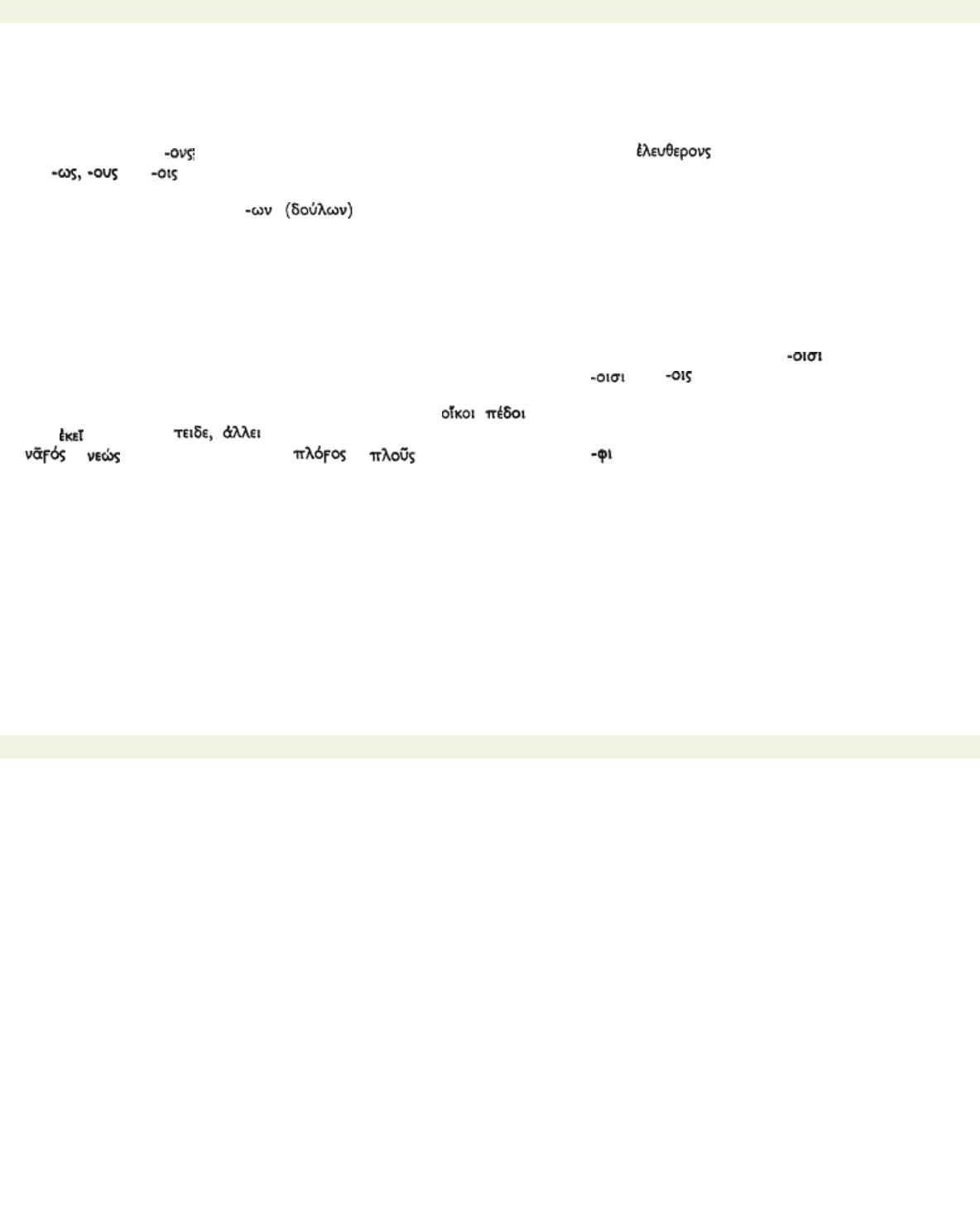
< previous page page_269 next page >
Page 269
Greek) in *-a, which may come from *-oH, which > -a before a consonant and -d before a vowel. Greek
generalized the short form (but cf. Skt. yuga).
Accusative *-ns.
still survives in a number of Greek dialects (e.g. Cret. ), but it developed variously
to
, or in others (see below).
Genitive *-om/-om. Greek corresponds to Sanskrit -am. The disyllabic scansion in Vedic suggests
that -om arose in the o-declension from *-o-om, whence it spread to the other declensions. The archaic Latin forms
like deum may derive from either -om or -om.
Dative. The Greek datives descend from either locatives in *-oisu or instrumentals in *-ois. Mycenaean still
distinguishes datives in -o-i (most probably representing -oihi) and instrumentals in -o standing for -ois, the vowel
having been shortened by Osthoff's Law (p. 215). The change of *-oisu to *-oisi may have been due to the
influence of the singular *-oi, the further change to -oihi being regular. The intervocalic -s- in
is presumably
due to the influence of the consonant stems. On the selection between
and in the Greek dialects see p. 124.
The IE locative singular *-oi survives in forms like , , etc., and the alternative Ablaut form *-ei in adverbs
like (on Doric , etc., see p. 286). On the Attic peculiarities occasioned by quantitative metathesis (
> ) and by contraction ( > ) see pp. 62 f. On the case see below. On other case relics see
under Adverbs (pp. 283 f.).
2. A-Stems
This declension occupies an intermediate position between the thematic and the athematic types. Thus it has the
genitive in -s and not that in *-osjo. On the other hand, like the o-stems, it has replaced the inherited nominative
plural *-as (< *-a + *-es) by -ai on the analogy of -oi, taken by the o-stems from the pronominal declension. This
interaction of the -o- and -a-stems was occasioned by the fact that -a was used to form feminines corresponding to
the masculines of the o-class. This is thought to have been a specialization of a wider function of the -a-suffix.
Since *-i- and *-u- feminines correspond to i- and u-stems, it is likely that all three feminine formations go back to
a laryngeal, so
< previous page page_269 next page >
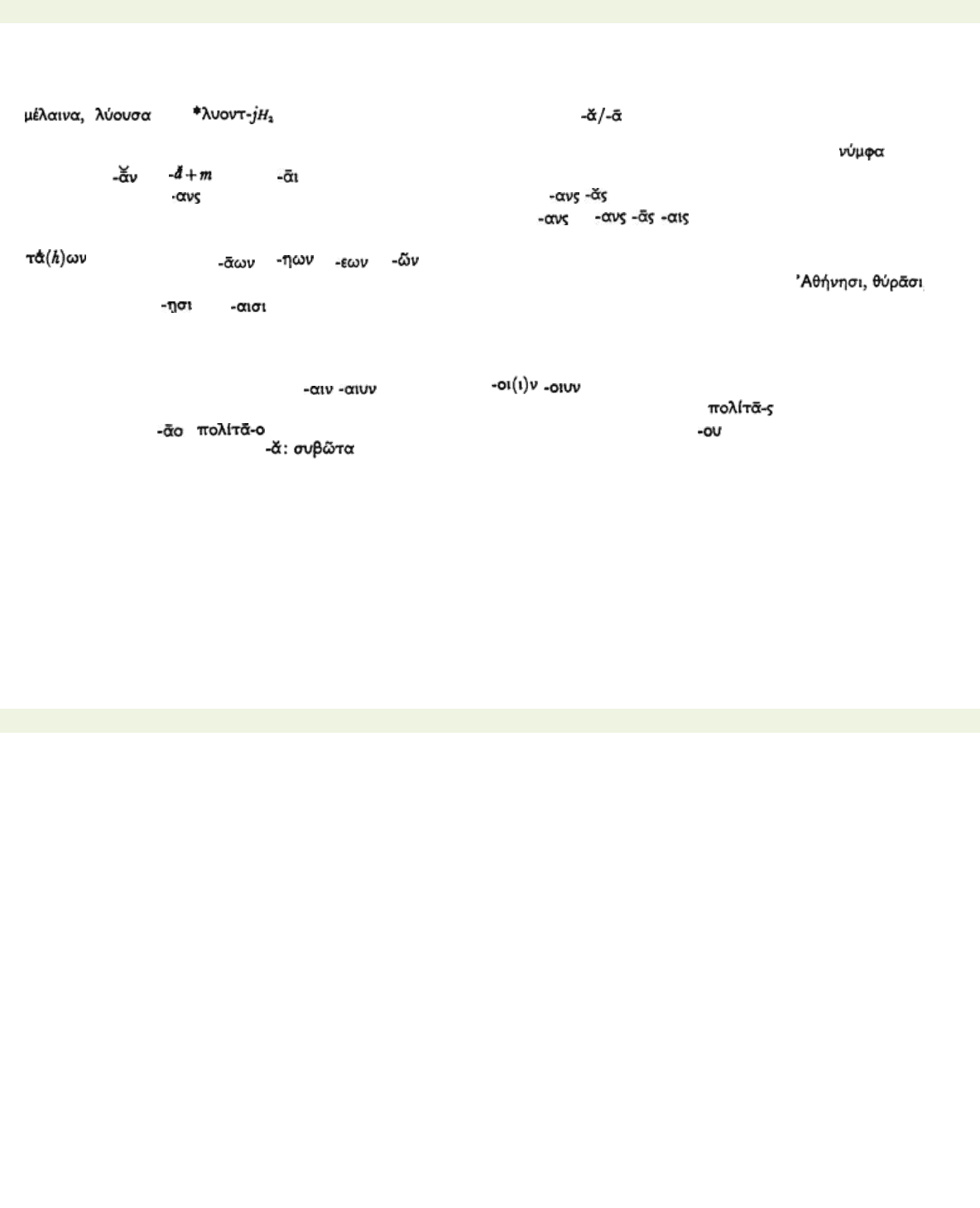
< previous page page_270 next page >
Page 270
that -a < *-0 + H2. To this declension also belong feminines with the suffix *-jH2 (Skt. -i see pp. 248 f.):
(< * ), etc., which show Ablaut alternation
The other case forms call for little comment. In the singular, the vocative originally ended in -a (e.g. ),
accusative
< * , dative < *-a+-ei,, this form converging with the locative < *-a+i. In the plural
accusative *ans >
, which developed alternative sandhi forms / before vowels and consonants
respectively. On the dialect selections and the developments of
to / / , see above. In the genitive,
Greek, like Italic, replaced *-om by *-som, drawn from the demonstrative pronoun (Skt. tasam, Lat. (is)tarum, Gk.
). In Attic-Ionic > > > . The dative presents alternative forms traceable to 1, -ais, an
instrumental analogous to *-ois, which regularly > -ais, and 2, -asi, a locative still preserved in
,
etc. The endings
and are blends. For the dialect distribution, see above. In the dual, *-ai (cf. Skt. -e) was
replaced by -a on the analogy of the -o of the o-stems. For the Mycenaean nominative torpezo and dative wanasoi,
see p. 46.
The genitive and dative dual have
/ , parallel with / . The masculines of this declension show
features ascribable to the influence of the o-stems' 1, -s is added to the nominatives (
, etc.), and 2, the
genitive ends in
( ; for the dialects, see above), which Attic replaced by . For the vocative there are
numerous archaic forms with
, etc. For the Mycenaean duals in -ae see p. 46.
3. the Athematic Declension
In this class an archaic feature of basic importance is the shifting of the accent from the stem to the inflexion with
the concomitant Ablaut alternations; this gave rise to the distinction between the strong and the weak cases, the
accent failing on the terminations of the latter. Lengthening (vrddhi) is often observed in the nominative singular of
animate nouns. In the ideal example the strong cases are singular: nominative, vocative, accusative and locative;
dual: nominative and accusative; and plural: nominative, vocative and accusative; but the system was already in
dissolution even in IE times. Sanskrit pitár- 'father' serves as an example of stem alternations' vrddhi in singular
nominative
< previous page page_270 next page >
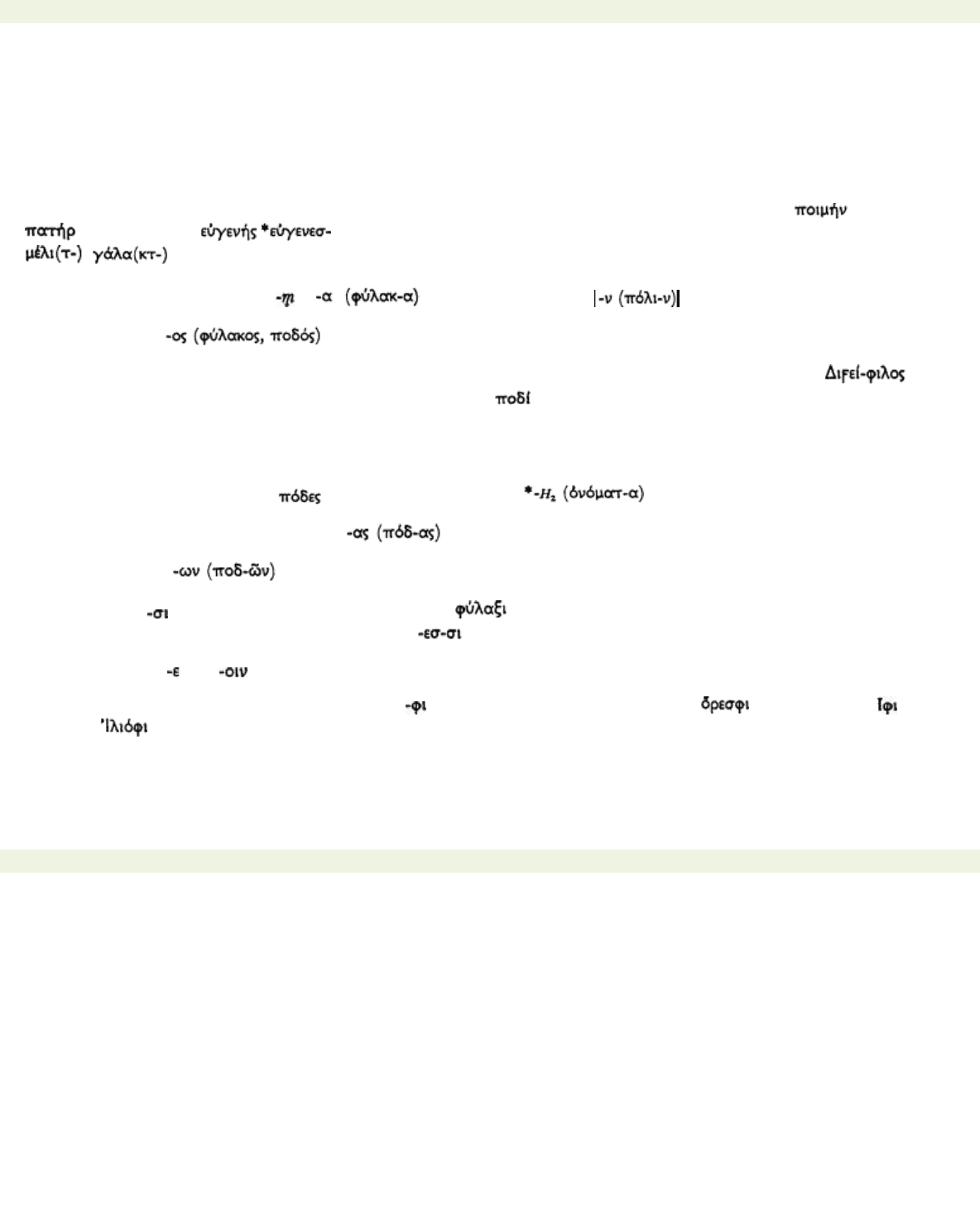
< previous page page_271 next page >
Page 271
pita *; normal grade in singular accusative pitár-am, vocative pítar, locative pitár-i, dual nominative accusative
pitír-a(u), plural nominative pitár-as, vocative pítar-as; zero grade elsewhere, e.g. singular instrumental pitr-a,
dative pitr-é, plural locative pitr-su*.
Singular
Nominative. *-s in most classes, but some have lengthening (vrddhi) of the stem: e.g. n-stems (
), r-stems (
), and s-stems ( / . Neuters have a zero ending and lose the final plosive(s) of the stem (p. 5):
, .
Accusative. After consonants * > . After vowels *-m > .
Genitive. *-os >
.
Dative. -ei is still largely preserved in Mycenaean (p. 46), but later survives only sporadically (e.g.
).
This termination was replaced by -i, a locative formation (
), the process having begun already in Mycenaean,
particularly in the s-stems.
Plural
Nominative. *-es is preserved ( ). The neuters have -a <
Accusative. *-ns* (after consomants) > . For the dialect developments of *-ns after vowels, see p. 237.
Genitive. *-om >
.
Dative. *-su > , under the influence of singular -i ( ). For the phonetic developments in various stems, see
below. For the analogical extension in Aeolic of
(originating in s-stems) see pp. 55 f., 96.
The dual endings and need no further discussion.
Post-Mycenaean Greek presents a case-ending in a variety of functionslocative ( ), instrumental ( ) and
ablative ( ), both in the singular and the plural. But this was largely an artificial development of the original
usage still evident in Mycenaean, where it is used almost exclusively (a) in the plural, (b) of athematic stems, and
is added directly to the stem (see p. 45). Thus Greek maintained the IE distinction between the instrumental plural
endings -ois and -bhi(s) which
< previous page page_271 next page >
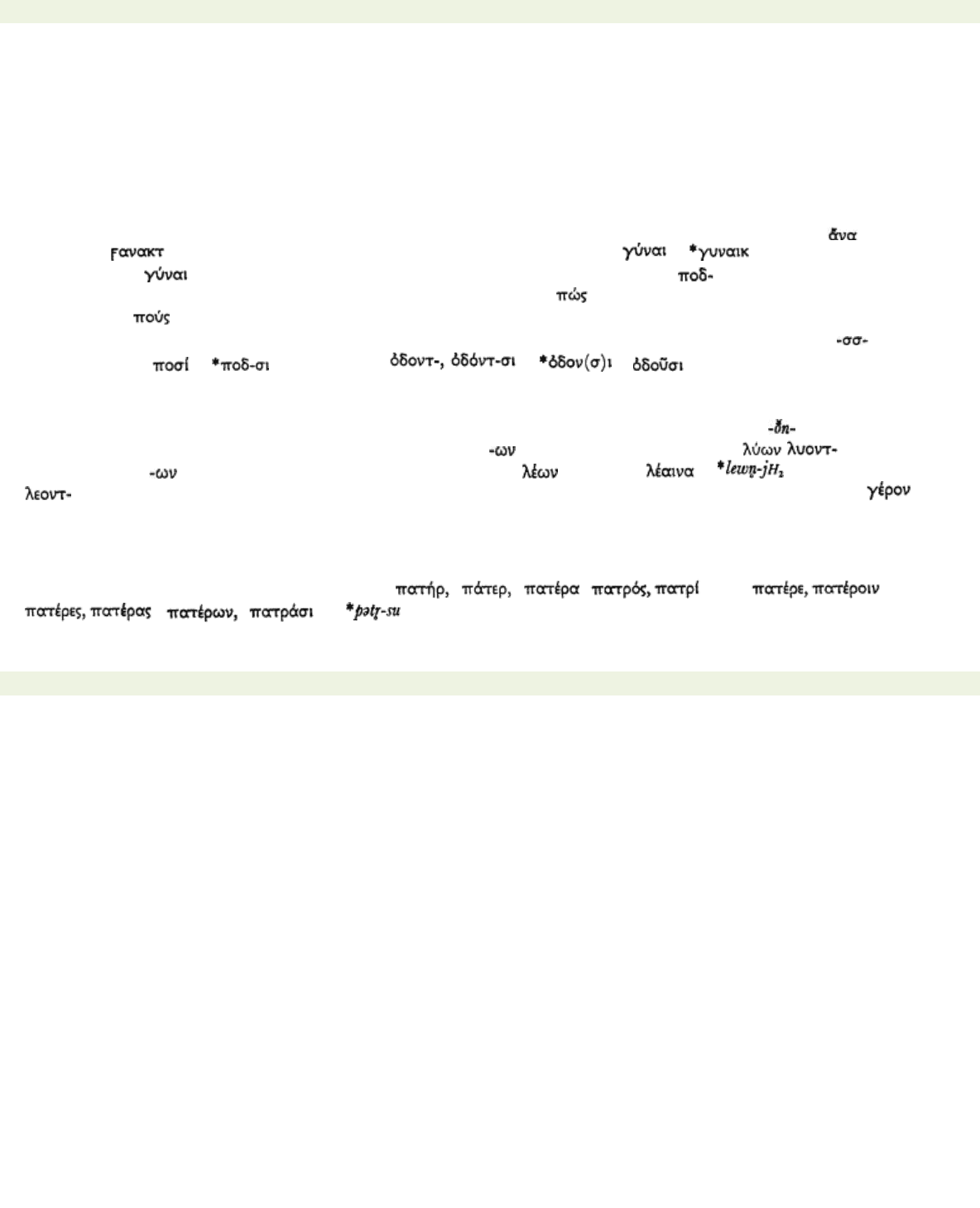
< previous page page_272 next page >
Page 272
is also reflected in the Sanskrit declensions (-ais/-bhis). The formant -bhi- also appears in the IE (on the dialect
distribution see p. 6) dative-ablative dual (*-bhyo) and plural (*-bhyos). Meillet pointed out that labial plosives
figure neither in the suffixes nor terminations of IE. It is conjectured that these case forms originated in a
'postposition' *-bhi.
Plosive Stems
The different stem-classes require further comment. Among those ending in a plosive, the vocative
shows the
bare stem
with loss of the final plosives. The same may be true of < , although it has been
suggested that
is an ancient vocative form. The word for 'foot' has o-grade (possibly originating in
compounds) contrasting with the Latin ped-. A lengthened vowel
appears in the nominative (cf. Sanskrit pad
*). The Attic
cannot be original and is presumably due to some analogical influence difficult to determine. In
the dative plural the -s- occasioned a variety of phonetic changes. With dental stems -ts- and -ds- >
, which
was simplified:
< . In stems like > > . This stem originally showed
Ablaut alternation: dont-/dnt-* (Skt. accusative dánt-am, genitive dat-ás). The full grade has been generalized in
the Greek declension (as opposed to Latin dent- < *dnt-*) but the zero grade survives in the Mycenaean derived
adjective odatwent- < *odnt-went-* (p. 52). In the dative plural -ont- stems converged with
stems, with the
consequence that a number of stems form nominatives in
, notably the participles like / (see pp. 313
f.). Conversely stems were declined like -ont- stems: e.g. (feminine < , cf. Lat. leo, leonis),
. In these nouns the vocative was formed with the bare stem, with regular loss of the final plosive: .
Liquid Stems
Liquid stems have vrddhi in the nominative singular, zero grade in the genitive and dative singular and dative
plural, with normal grade elsewhere (singular
, ; dual ; plural
, (< ). This departs from the IE
< previous page page_272 next page >
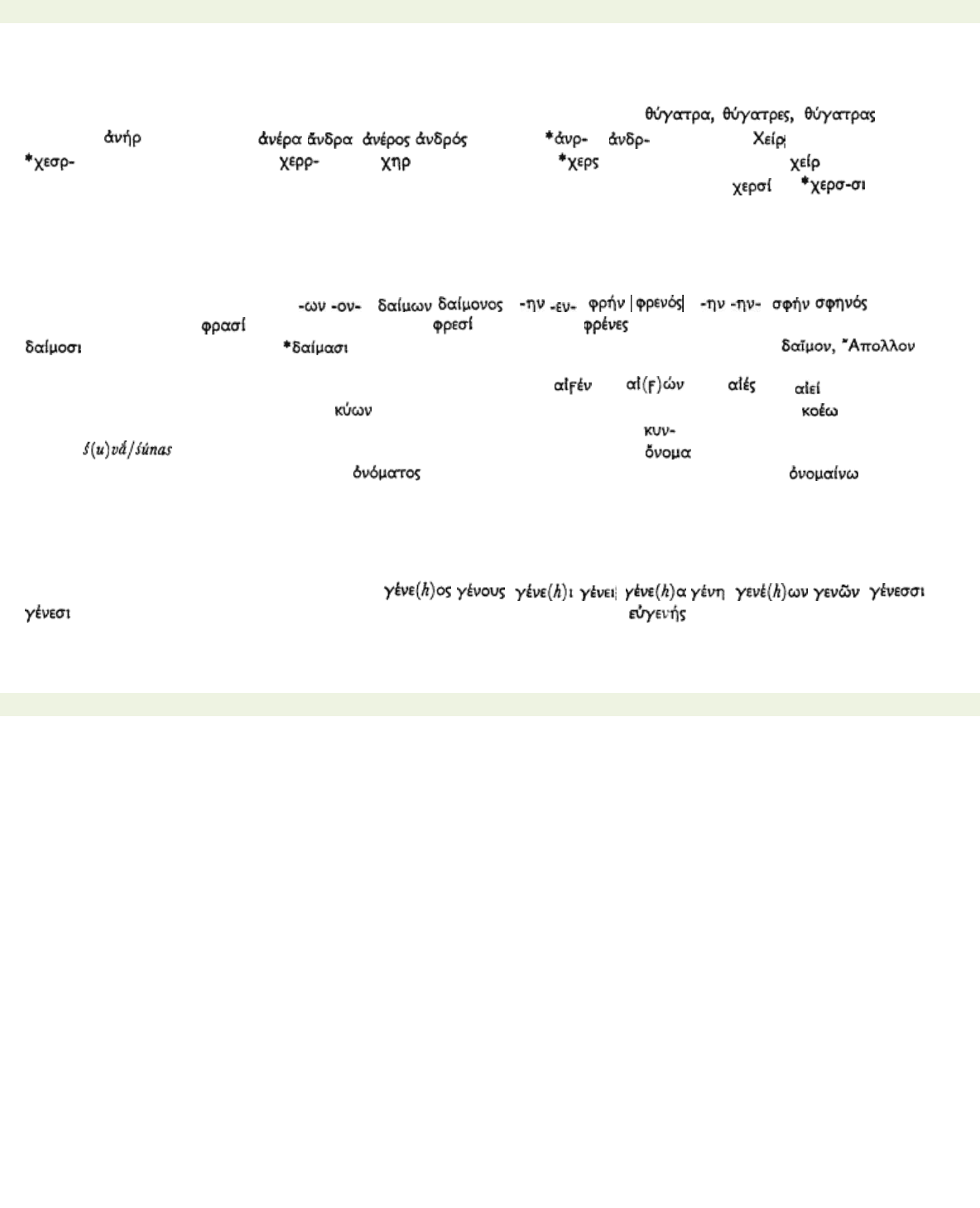
< previous page page_273 next page >
Page 273
pattern in which the zero grade appeared also in the accusative and genitive plural (see above on Skt. pitar-). On
the other hand there was analogical extension of the zero grade in forms like
.
Similarly
has variously / , / , etc. (for > see p. 240). derives from a stem
< IE *ghesr- (cf. Aeolic , Doric ). The nominative developed regularly to in Attic, and
this form of the stem was carried throughout the declension except for the dative plural
(< ).
Nasal Stems
Nasal stems in IE had *-on, with lengthened o-grade, in the nominative singular, *-en- with normal e-grade in the
accusative and locative singular and in the nominative plural, but zero grade -n- elsewhere. By different analogical
processes Greek evolved types in
/ , ( / ), / ) / ), / ( / ). The
zero grade appears in (< *bhrnsi *); in Attic the vowel of , etc. has been generalized, just as
has been substituted for . The vocative has the bare stem in the normal grade: , etc.
There is a trace of the ancient alternation *-on/-en- in the adverb , cf. . For and see Adverbs, p.
284. Ancient, too, is the declension of
, which may contain the zero grade of *kew- 'watch' ( , Lat. caveo)
and so meant originally 'the watcher'. The oblique cases have the zero grade
, this declension being paralleled
in Skt. , and Lith. uõ/suñs. Neuters in -mn* are an inherited class: (cf. Skt. nama, Lat. nomen). In
Greek this stem shows an extension -t- (
), which does not appear in the denominative (*onomn-
jo*).
S-Stems
The declension of the s-stems is complicated in Greek by the aspiration and subsequent loss of intervocalic -s-.
Thus the neuter type genos/genes- produced
/ , / , / , / , /
. The corresponding animate declension has vrddhi in the nominative , but elsewhere the normal grade
(e.g. nominative
< previous page page_273 next page >
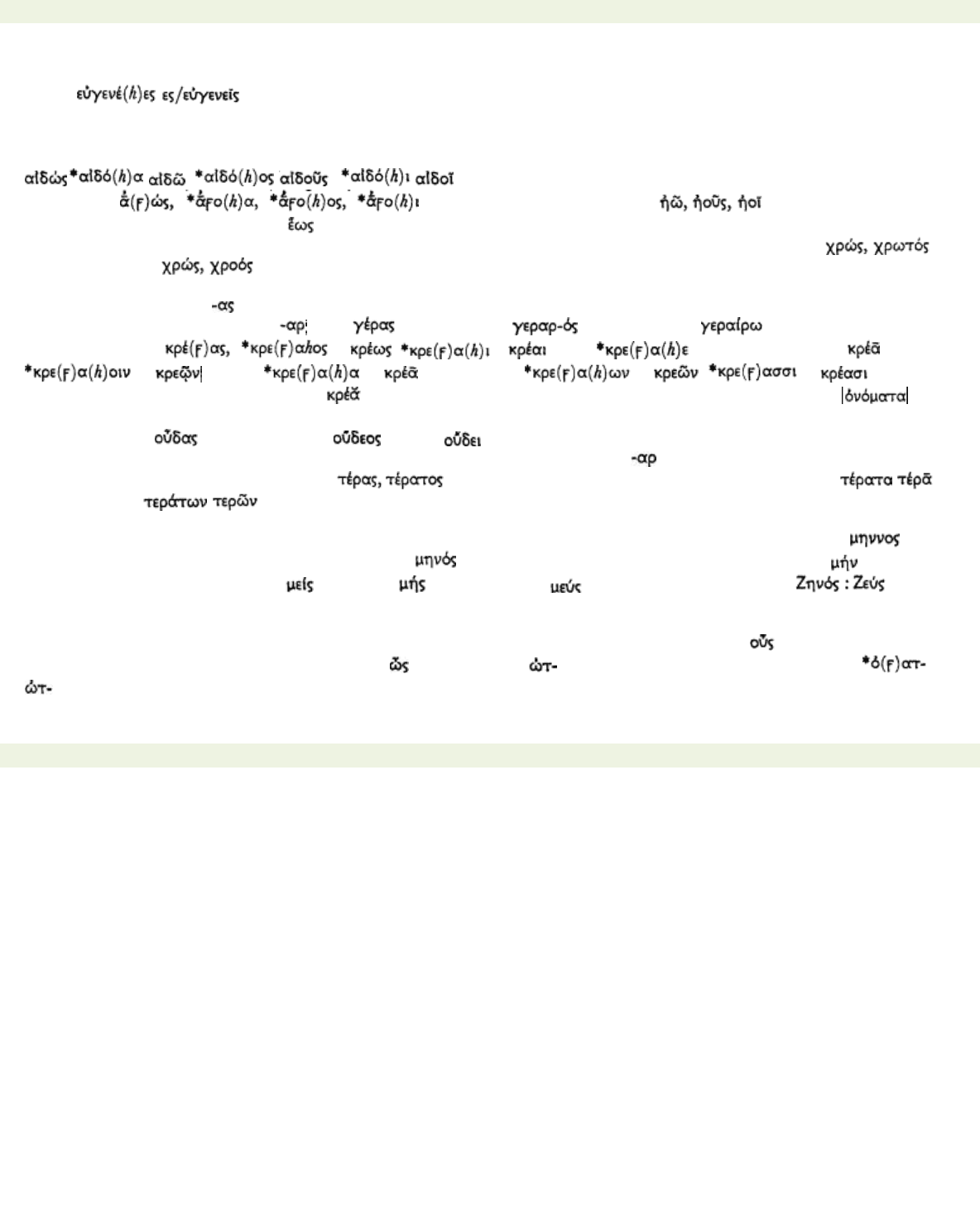
< previous page page_274 next page >
Page 274
plural
/ . On the phonetic complexities of the compounds in *-klewes (*klewos 'fame') see p.
239.
Another inherited type comprised the animate nouns in *-os-/-os- (cf. Latin honos, with e-grade in hones-tus):
/ , / . / . *ausos 'dawn' (Lat. aurora) originally followed the same
declension:
, are reflected in the Homeric . In Attic the regular
phonetic development produced
(with retraction of the accent), and this was absorbed into the 'Attic second
declension' (p. 191). Certain nouns of this inflexion acquired the t-extension of the stem, e.g. Attic
as
against Homeric
.
The class of neuters in represents another IE heirloom in Greek although it has been argued that some of them
are transformations of stems in (e.g. , but adjective , denominative ). The declension is as
follows: singular
> , > ; dual (cf. Myc. dipae) > ,
> ; plural > (see below), > , > . The
nominative-accusative plural is often
. This may be due to the influence of other declensions like , but
it has been suggested that it goes back to an old collective *krewH2. The -os-/-es- neuters also exert a pull on this
declension: e.g.
has the genitive , dative . Some of the -as- neuters also have the t-stem in oblique
cases, and this has been regarded as another indication that they were once
stems with the heteroclite oblique
stem -nt * (see below). An example is , etc.; in the plural we have the alternative forms /
(< *tera(h)a), / (< *tera (h)om).
The word for 'month' in Greek originates in *mens-, an old s-stem. In Aeolic the genitive *mens-os > (for
the stem cf. Lat. mensis), but in other dialects >
, which gave rise to the analogical nominative . The
nominative *mens-s > *mens >
(Attic) or (Doric). Elean was created on the model (see
below).
Another s-stem with heteroclite declension is the word for 'ear': nominative singular Attic
(not a diphthong on
the evidence of the early spelling OS), Doric ; genitive, etc. points to *owos/*ownt-*, the latter > >
. The stem
< previous page page_274 next page >
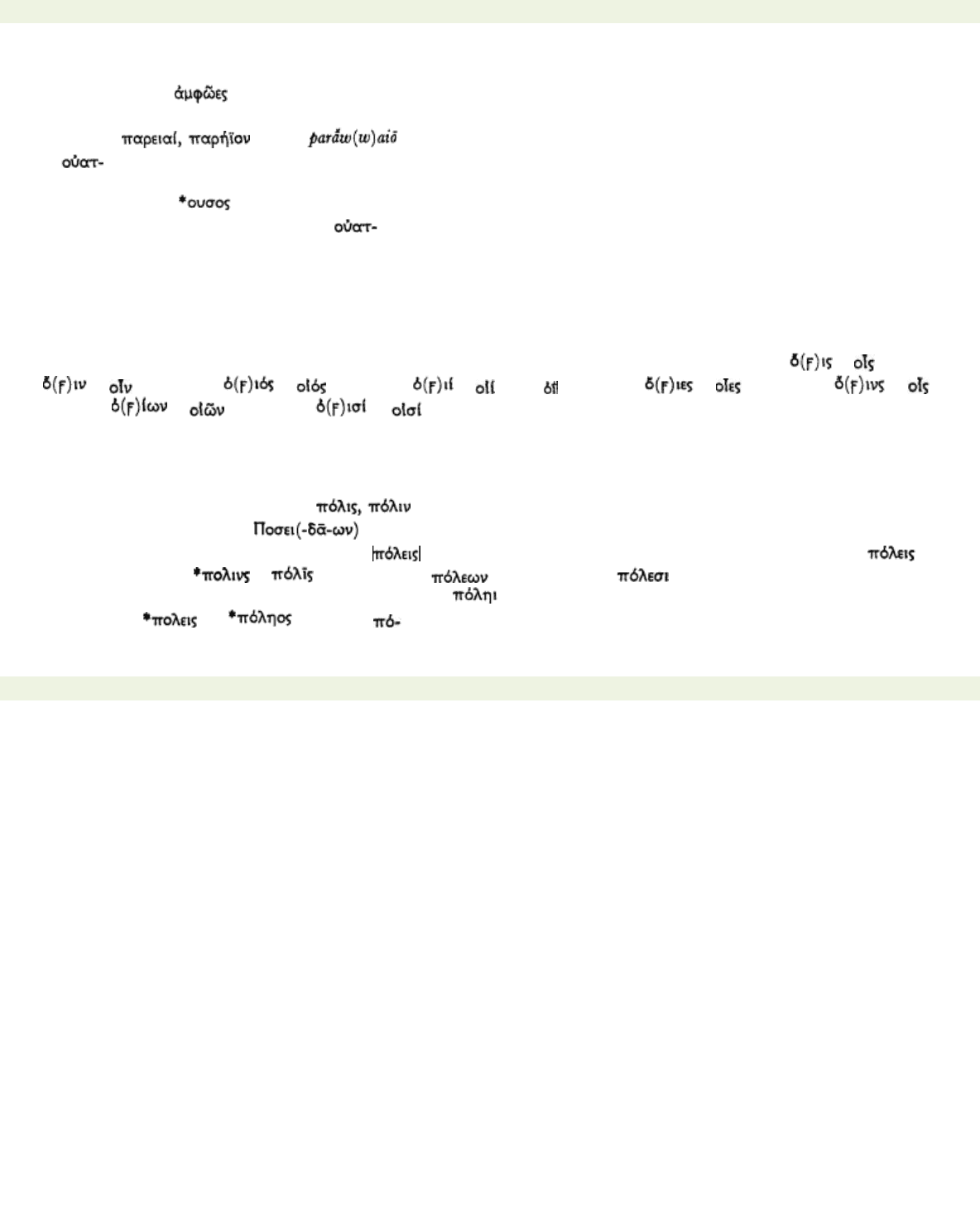
< previous page page_275 next page >
Page 275
*owes- appears in 'with two handles', cf. Myc. anowe = anowes 'without handles'. Other languages,
however, show a stem *aus-, e.g. Lat. auris (the i-stem perhaps from a dual form *ausi), aus-culto, and this forms
the basis of
, Myc. < *par-aus-io-/ia.. Homer, again (also later poets and inscriptions)
had
. To accommodate all these forms some scholars posit *ous-, with zero grade *aus-; others again
*ousos/*ouses-/*ousnt- *. A more recent view postulates *aus-/*us- with an s-stem *ausos/*auses-, *ausos
changing to Greek
under the influence of *oqw-* 'eye'. The declension became heteroclite on the lines of
other anatomical words. The Homeric
is explained as metrical lengthening, and the similar inscriptional
forms are dismissed as Homericisms.
Stems in -I, -U, and -Eu
Here two types are distinguished: 1, those in which the suffix remains invariably -i or -u, and 2, those in which it
ablauts *-i/-ei, *-u/-eu, with a lengthened form (vrddhi) *-ei and -eu in certain positions, the Ablaut alternations
being occasioned originally by accentual shift. An example of x is the word for sheep *owis >
> , *owim
> > , *owjos > > , *owjei > > (also ), owjes > > , *owins > > ,
*owjom > > , *owisu > > . More frequent was type 2 with -e-grade of the suffix originally
in the vocative, genitive, and dative singular and the nominative plural: *-is, *-ei, *-im, *-eis, *-ejei, *-ejes.
Particularly characteristic is the replacement of the genitive singular *-eis in Greek by -i-os.
In Attic Greek there was considerable rearrangement, with the consequence that the zero grade appears only in the
nominative and accusative singular'
. The IE vocative had the full grade of the suffix -ei, and this
survived in the divine name
'O Lord of the Earth'. In the declension it has been replaced by the zero
grade. In the nominative plural regularly >
, and the -e- has been extended to the accusative plural <
*polens (for original
> ), the genitive , and the dative . In the singular there is evidence
for a dative (an ancient locative) with vrddhied stem
, and this stem-form was transferred also to the genitive,
thus replacing
by , which >
< previous page page_275 next page >
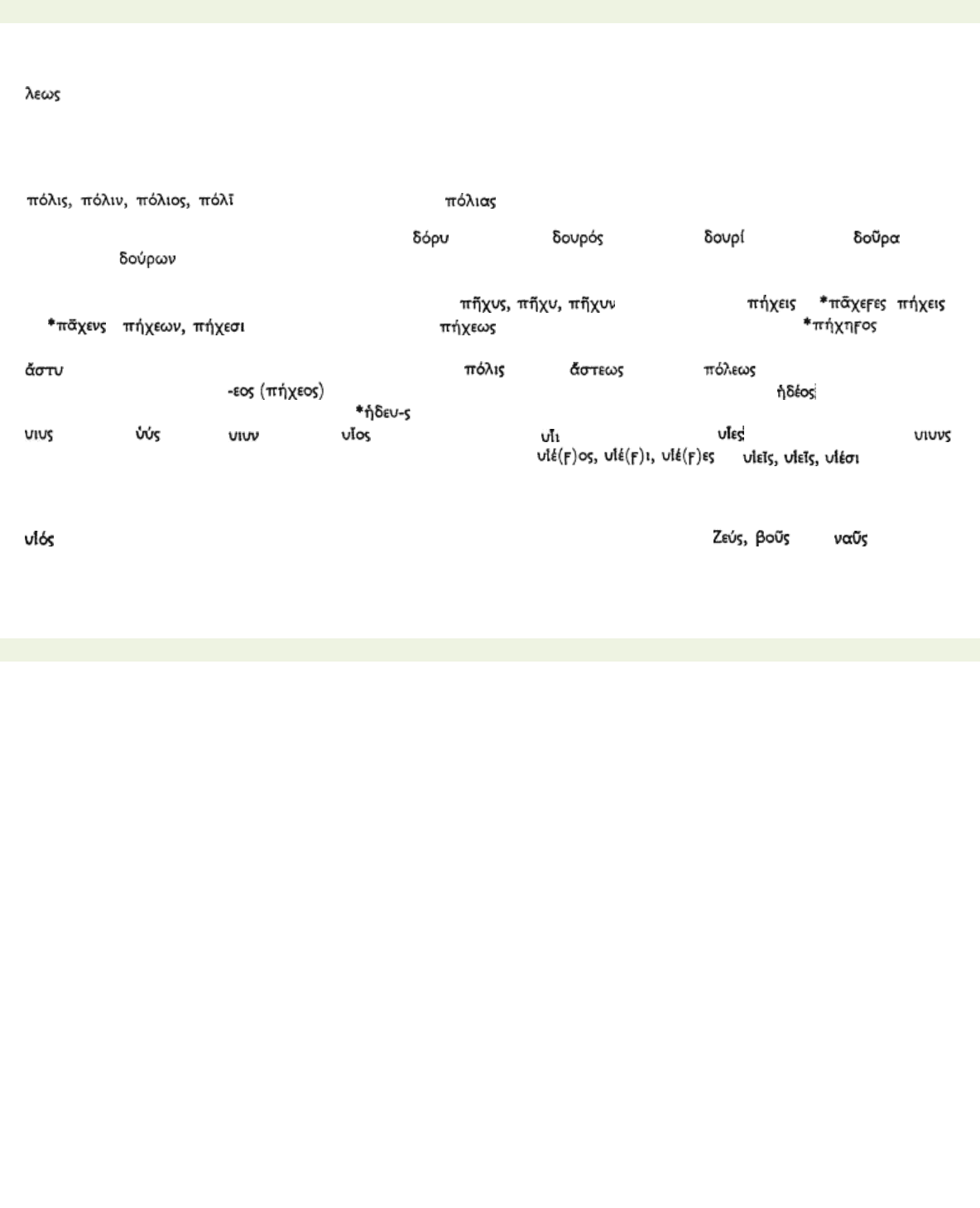
< previous page page_276 next page >
Page 276
by quantitative metathesis, the position of the accent betraying the originally short final vowel. An alternative
explanation, which starts with a declensional pattern *polei-s/ polj-os, etc., with a levelling to *polej-os etc., hardly
seems preferable, for this analogical generalization would have to be dated before the proto-Greek change *poleis
to poleis (Osthoff's Law), while the insertion of polis, polin in this levelled declension would remain without
explanation. In all dialects except Attic the stem form -i was extended throughout the declension:
, etc. The accusative form owes its ending to the consonant stems.
In the u-stems type 1 is represented by *doru >
, *dorwos > , *dorwei > , *dorwH2 > ,
*dorwon >
. In the type 2 the original inflexions were: singular, *-us, *-ou, *-um, *-eus, *-ewei, *-eu;
plural *-ewes, *-uns, *-uwom, *-usu. In Greek the e-grade, as with -i/-ei stems, was extended to all cases except
the nominative, vocative and accusative singular: e.g.
, with the plural < ,
(< ), . In Attic the genitive is , where the accent indicates an earlier , with a
grade which might be traced to the vrddhied locative form in *-eu. It is conceivable, however, that a word like
might have been influenced by the declension of so that parallels . In non-Attic dialects
the genitive singular has , and this is found even in Attic in the u-adjectives, e.g. < *swadewos,
this being a refashioning of the expected
. *suju- 'son' shows forms belonging to both declensional types:
(Cretan), (Attic), (Cretan), (Homer) < *suwjos, (Homer) < *sujwi, (Homer) < *sujwes,
(Cretan> < *sujuns.. The full-grade suffix -ew- also appears in > .
Mycenaean presents the dative form ijewe, plausibly interpreted as hijewei, with nominative iju = hijus, both with
dissimilatory loss of the first u. Dissimilation was also presumably responsible for the passage to the thematic class
, etc. (Homer, etc.). To the u- stems also belong the diphthongal stems of the type , and . The root
*dei- 'shine' with u-suffixation gave rise to the base forms I *dei-w- (Latin deivos/divus) and II *dj-ew-. From the
latter comes the vrddhied nominative *dj-eu-s. In the accusative the IE form *dje-m, with
< previous page page_276 next page >
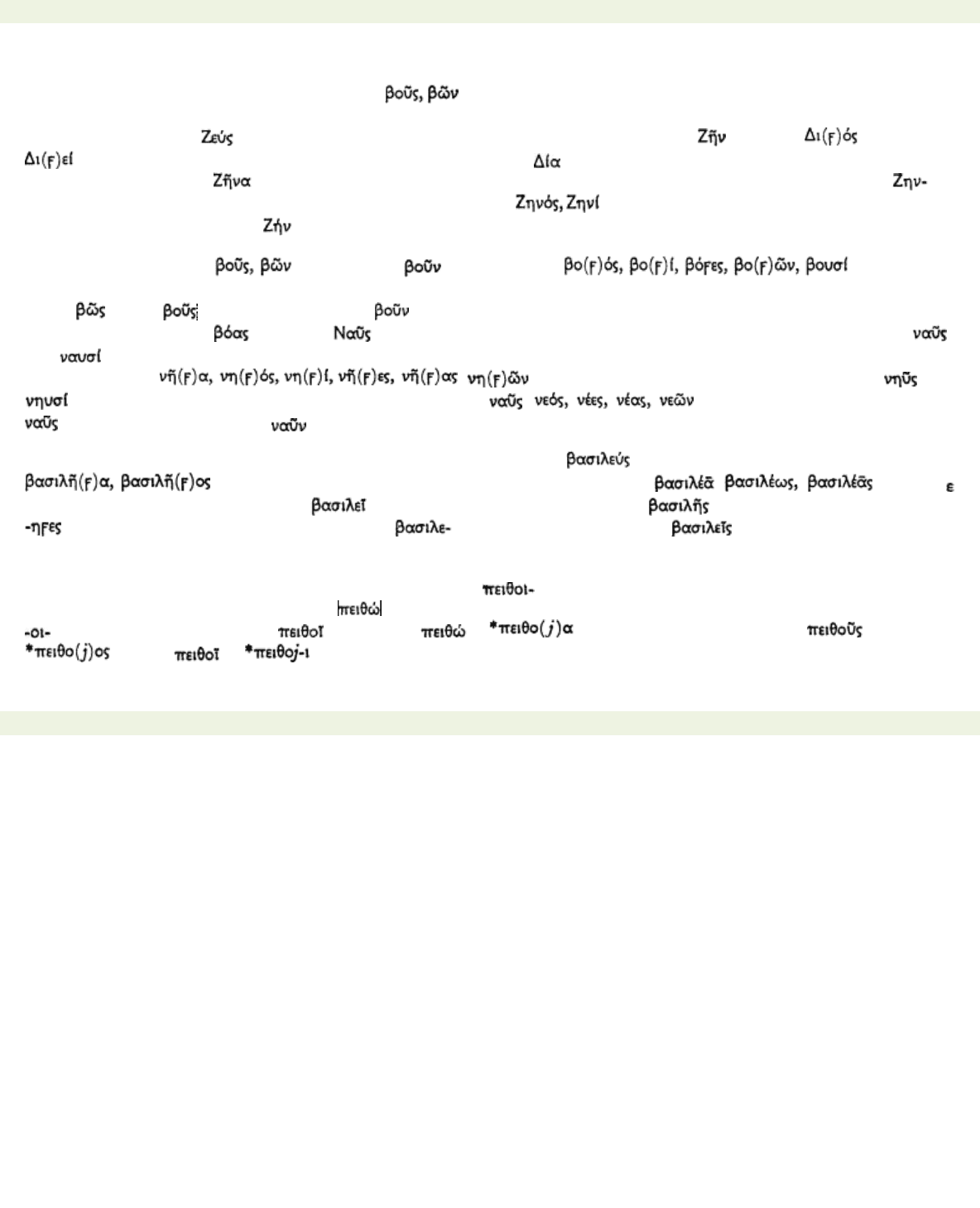
< previous page page_277 next page >
Page 277
loss of the second element, is postulated (cf. < *gwous *, *gwom*). The III form of the base di-w-
appears in the genitive *diwós and the dative *diwei. This series of forms by regular development produced the
paradigm nominative
(with shortening according to Osthoff's Law), accusative , genitive , dative
. The accusative suffered two kinds of transformation. In the stem form Of the genitive and dative has
been introduced, while
has received the characteristic case-ending of the consonantal stems. The stem
extracted from this form gave rise to the levelled declension (already Homer, but Mycenaean has diwo,
diwe) and even a nominative
.
Similar is the origin of
(Doric; Attic is analogical), , which go
back to *gwous*, *gwo(u)m*, *gwowos*, *gwowei*, *gwowes*, *gwowom*, *gwousu*. In the accusative plural
Doric
(Attic parallels the singular ) resembles Skt. gas, but we should expect *gwowns*, which has
its regular reflection in
(Homer). (*naus, or perhaps < *naH-u-s) shows no Ablaut alternations, for
and have regular shortening (Osthoff); the other cases have the inherited long vowel (cf. Latin navis) with a >
h in Attic-Ionic; , . The long vowel has spread analogically to and
. Shortening of h in hiatus produced the Ionic forms , . In Attic the accusative plural is
, parallel with the singular .
A vrddhied suffix -eu- also appears in the Greek nouns of the type with a declension
, etc. Quantitative metathesis produced the Attic forms , , and the
was introduced also into the dative . The early Attic nominative plural is the regular development <
, but the generalization of the stem-form gave rise to the later form , which was also
substituted for the earlier accusative plural.
The suffix in the feminine diphthongal stems of the type
may be regarded as an ablaut alternation of *-ei-
with vrddhi in the nominative singular
(cf. the Sanskrit type sakha, accusative sakhayam, dative sakhye) but
in the other cases: vocative , accusative < ( < *bheidhoj-m*), genitive <
, dative < .
< previous page page_277 next page >
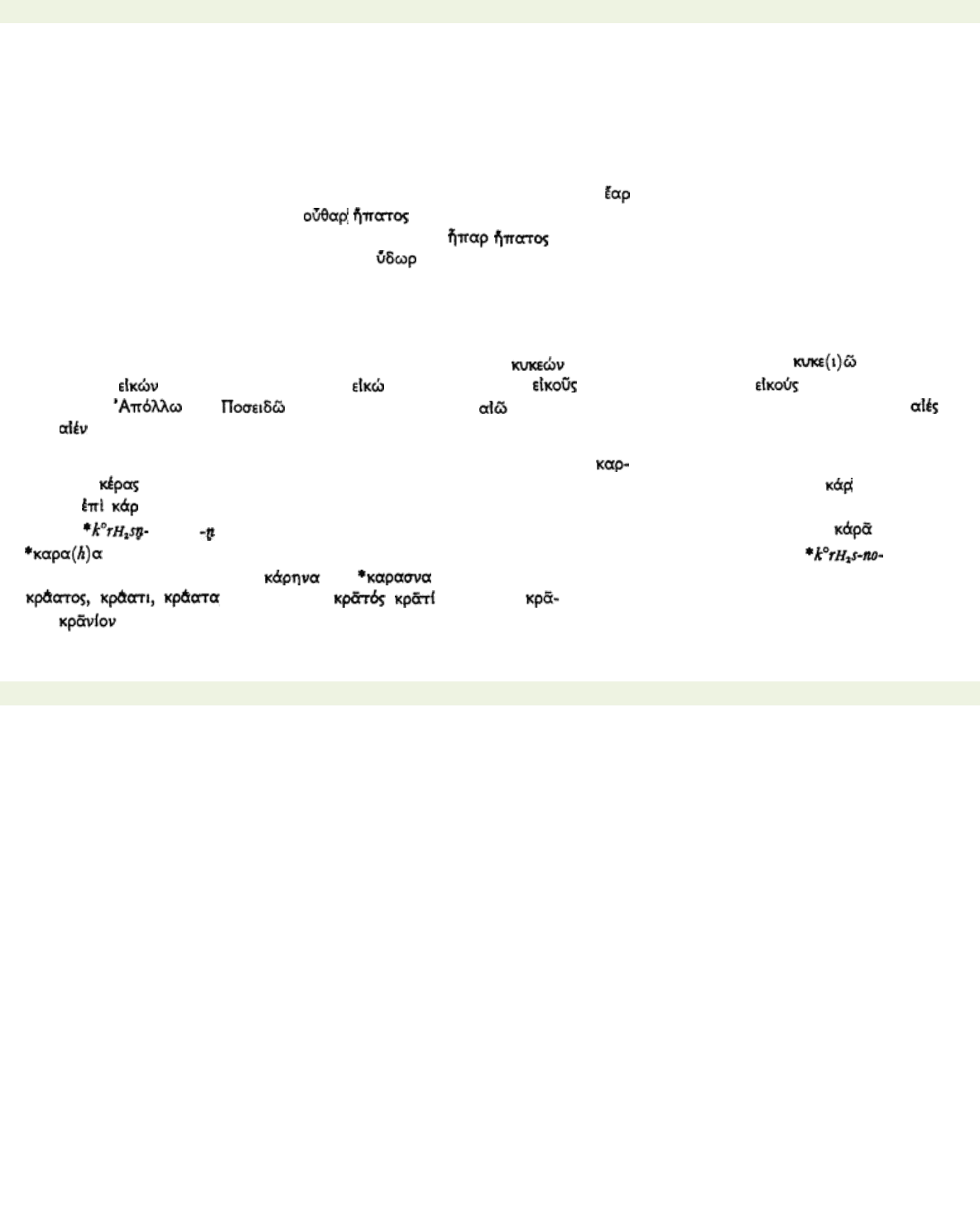
< previous page page_278 next page >
Page 278
Heteroclitic Nouns
IE possessed in abundance a type of neuter nouns in which the nominative-accusative had the stem in -r-, but the
oblique cases in -n-. This type survived as sparse fossil remains in most IE languages but was still vigorous in the
Hittite declension, both in the simple forms -ar/-na- as well as in the compound forms -mar, -sar, -tar and -war.
Hittite eshar */ena 'blood' is paralleled by Skt. ásrk/asnás; but in Greek
'blood' the r-stem has been generalized.
Skt. udhar*/udhnás is reflected in
/ < *oudhr*/*oudhn-*. The -t- is a stem extension which figures in
the Skt. nominative yákrt, genitive yaknás ' liver', cf / ( < *jeqwr*/jeqw-n-t-os*).Some nouns have a
vrddhied form of the suffix. An example is
, with which the Hittite plural widar (singular watar) may be
compared, though the latter has full grade stem wed- (cf. dative-locative wedeni). The -r/-n alternation recurs in
Gothic nominative wato (*wodor), genitive watins (< *woden(o)s), and it is still reflected in the opposition of
English water versus Swedish vatn.
There are a few traces of a heteroclite declension -on-/-os-:
has the Homeric accusative (< *o(h)a
< *-osm*);
has accusative singular , genitive singular and accusative plural . Add to these the
accusative
and . Finally, the accusative < *aiwos-m* may be compared with the adverbs
and , both locatives with zero inflexion (p. 284).
The complex morphology of the word for 'head' centres round the root < *kr-*, the zero grade of *ker-, which
provides 'horn' ( < *ker-H2-s). A stem form *kr-s- would satisfactorily account for the fossil in the
phrase 'headlong'. The s-stem may receive an n-extension (e.g. Skt. síras> 'head', genitive singular sírsnás);
so that
, with in the nominative as in *onom-n*, would satisfactorily account for the Attic via
, where the three vowels a all have different origins. A thematized version of this stem would
develop to the Ionic (Homer)
via . The heteroclite stem *-n-t* (with -t- extension) appears in
contracted to , , etc., with presumably from the II base form *kreh2-s-n-
(cf. < *kreH2-s-n). In other Homeric forms
< previous page page_278 next page >
